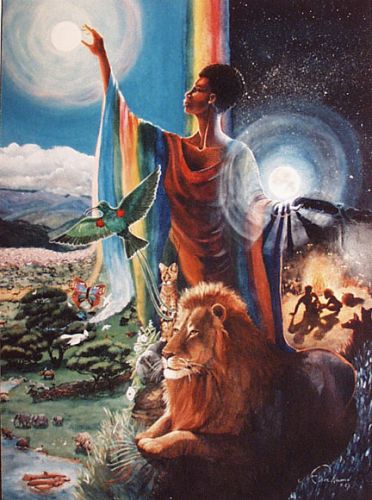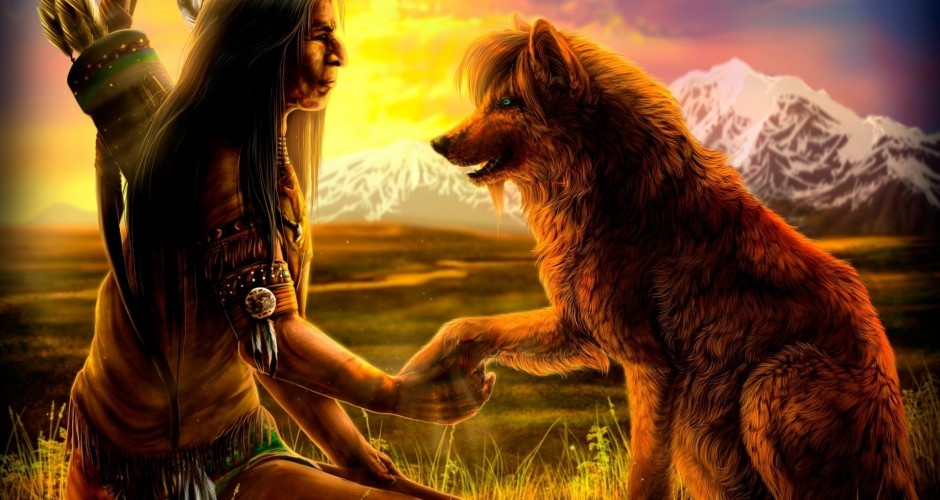The Hindu and Buddhist Gods and Goddesses in India, Nepal, Bali, Burma, Japan, Korea, Sri Lanka, Thailand and elsewhere are only local expressions of a universal spirituality. In this respect, spirituality is akin to science. Astronomy, Biology, Chemistry, Geology and Physics reveal the same secrets of Nature to all men everywhere and at all times, no matter in what language those secrets are couched or communicated. In like manner, the spontaneous expressions of spirituality have been the same everywhere and at all times, though the language and metaphor of those expressions have been different according to culture and clime.
All Ancients worshiped many gods
 There was a time when the ancient Assyrians, Babylonians, Chaldeans, and Egyptians worshipped a multiplicity of Gods in the form of icons installed in innumerable temples. The ancient Iranians paid homage to the Fire God in their sacred shrines.
There was a time when the ancient Assyrians, Babylonians, Chaldeans, and Egyptians worshipped a multiplicity of Gods in the form of icons installed in innumerable temples. The ancient Iranians paid homage to the Fire God in their sacred shrines.
The Gods of the Greeks and the Romans are well known in spite of a large-scale destruction of their physical manifestations by the vandals of Christianity. The Britons, the Celts, the Franks, the Germans, the Scandinavians, and the Slavs also sensed their Gods as residing in many a mountain, river and forest.The pre-Islamic Arabs had many Gods and worshipped them in many sacred shrines besides the principle one at Kaaba before the prophet of Islam presided over their destruction.
Nearer home, the pre-Islamic Turks in Central Asia and the pre-Islamic Indonesians and Malaysians to our south were Hindus and Buddhists with similar ways of worship as we have in this country. The Cambodians, the Chinese, the Laotians, the Mongolians, the Tibetans and the Vietnamese had their own Hindu-Buddhist Gods till the other day before they fell into the clutches of the Communist monolith.
The Native Americans in North, Central, and South America practised what their Christian invaders from Europe denounced as ‘idolatry’. The so-called aborigines of Africa, Australia, New Zealand and the far-flung islands of Oceania did the same, and met the same punishment at the hands of Christian invaders and missionaries.
The physical destruction of the icons and temples does not mean that the Gods have been destroyed. Nor have the Gods become outdated. They do not belong to a distant past. On the contrary, they are always there, waiting to be witnessed and worshipped by any one who prepares oneself to be admitted to their presence. For they dwell in a dimension which defies time and space. They dwell in the depths of the human heart, in the innermost sanctuary of the human soul. Their disappearance from the physical scene only means that human spirituality has become shallow, and suffered a steep decline.
Hindu Gods providing a link to the Ancient Gods
 Author Ram Swarup has drawn our attention to this eclipse of the ancient Gods of many people after those people were forcibly converted to Christianity or Islam, and their temples were destroyed or converted into churches or mosques. I shall, therefore, quote again at some length from his book, The Word As Revelation: Names of Gods:
Author Ram Swarup has drawn our attention to this eclipse of the ancient Gods of many people after those people were forcibly converted to Christianity or Islam, and their temples were destroyed or converted into churches or mosques. I shall, therefore, quote again at some length from his book, The Word As Revelation: Names of Gods:
There was a time when these Gods satisfied the religious urges of their devotees. But in the course of time they came under attack from new Gods that were appearing on the horizon. They are by now completely replaced but the old persecution still continues though in a modified form. The new persecutors are not theologians and religious zealots but staid academicians. To them these Gods are not false but primitive.
They hold that these Gods represented the attempt of the primitive mind to express, however imperfectly, through Nature’s symbols and objects, its groping for a unitary principle. At this stage of human evolution, it was difficult for man’s mind to rise above the sensuous to the intellectual and the spiritual, and from the many to the one. That was left for a later generation to achieve, reaching its high water-mark in Christianity and modern Europe.
If Gods are born of religious urges and spiritual intuitions, it is difficult to see how modern European Christians are superior in this respect and, therefore, how their ‘one God’ could be truer than the ‘many Gods’ of their ancestors.
‘A look at the Hindu Gods may throw light on this aspect of the subject. The Hindu pantheon has changed to some extent but the old Gods are still active and are still understood though under modified names. Hindu India has a sense of continuity with its past which other nations, that changed their religions at some later stage, lack. It is also known that the Hindu religion preserves many old layers and forms.
 Therefore, its study may link us not only with its own past forms but also with the religious consciousness, intuitions and forms that prevailed in the past in Europe, in Greece, in Rome, in many Scandinavian and Baltic countries, amongst Germanic and Slavic peoples and also in several countries of the Middle East. In short, the study may reveal a fundamental form of spiritual consciousness which is wider than its Hindu expression.
Therefore, its study may link us not only with its own past forms but also with the religious consciousness, intuitions and forms that prevailed in the past in Europe, in Greece, in Rome, in many Scandinavian and Baltic countries, amongst Germanic and Slavic peoples and also in several countries of the Middle East. In short, the study may reveal a fundamental form of spiritual consciousness which is wider than its Hindu expression.
‘This discussion should help to promote our understanding not only of Vedic religion and Vedic Gods but also of a whole archetypal spiritual consciousness which expresses itself in the language of Many Gods; and as a result should also help us to understand better the old religions of Europe and Asia which are no more; it should also help us to see in a new light the old Gods of Egypt, Persia, Greece, Rome, the Gods of the Scandinavian and Baltic countries, the Gods of the Germanic, Celtic, and Slavic peoples.
The Gods Return
 Ram Swarup pleads that a revival of universal spirituality should lead to a return of ancient Gods eclipsed by Christianity and Islam:
Ram Swarup pleads that a revival of universal spirituality should lead to a return of ancient Gods eclipsed by Christianity and Islam:
In the cultural history of the world, the replacement of Many Gods by One God was accompanied by a good deal of conflict, vandalism, bigotry, persecution and crusading. These conflicts were very much like ‘wars of liberation’ of today, hot and cold, openly aggressive or cunningly subversive. Success in such wars played no mean role in making a local deity, say Allah of certain Arab tribes, win a wider status and assume a larger, monarchical role.
Looking at the whole thing from the perspective of today, it is difficult to say whether the replacement was enriching or impoverishing in the spiritual and cultural sense. In most cases like these, outer symbols change without making any significant changes in their psychic meanings. It would, therefore, be difficult to hold that the present Gods of Semitic origin are superior to the now defunct pagan Gods. There was a time when the old pagan Gods were pretty fulfilling and they inspired the best of men and women to acts of greatness, love, nobility, sacrifice, and heroism.
 It is, therefore, a good thing to turn to them in thought and pay them our homage. We know pilgrimage, as ordinarily understood, as wayfaring to visit a shrine or a holy place. But there can also be a pilgrimage in time and we can journey back and make our offerings of the heart to those Names and Forms and Forces which once incarnated and expressed man’s higher life. They are holy Names and Symbols.
It is, therefore, a good thing to turn to them in thought and pay them our homage. We know pilgrimage, as ordinarily understood, as wayfaring to visit a shrine or a holy place. But there can also be a pilgrimage in time and we can journey back and make our offerings of the heart to those Names and Forms and Forces which once incarnated and expressed man’s higher life. They are holy Names and Symbols.
‘The present generations of many countries tend to regard their past as a benighted period of their history. A more understanding approach towards their Gods of old will work for a less severe judgement about their past and their ancestors. It will also fill the generation gap, not the one we talk about the most these days but a still wider one, the general rootlessness of a whole nation. Gods provide an invisible link between the past and the present of a nation; when they go, the link also snaps. The peoples of Egypt, Persia, Greece, Germany and the Scandinavian countries are no less ancient than the people of India; but they lost their Gods, and therefore they lost their sense of historical continuity and identity.
Today, there is a spirit of revolt amongst Western youths against their parents religion. Some are seeking light in new symbols. One of the most fruitful channels for them could be to explore the symbols of their more remote forefathers. This could help to broaden and deepen the religion of their parents with the religion of their ancestors.
What is true of Europe is also true of Africa and South America. The countries of these continents have recently gained political freedom of a sort. But it has done little to help them and to give them a spiritual identity. If they wish to rise in a deeper sense, they must recover their soul, their Gods, their roots in their own psyche; there has to be a spiritual reassertion, a resurrection of their Gods.
I f they need any change, and there is no doubt they do, it must come from within themselves as a part of their own experience. If they do enough self-churning, then their own Gods will put forth new meanings in response to their new needs. They have to make the best of their own psychic and spiritual gifts and discover their own Gods within themselves. No people can import their Gods ready-made and rise spiritually under the aegis of imported deities, saviours and prophets.
f they need any change, and there is no doubt they do, it must come from within themselves as a part of their own experience. If they do enough self-churning, then their own Gods will put forth new meanings in response to their new needs. They have to make the best of their own psychic and spiritual gifts and discover their own Gods within themselves. No people can import their Gods ready-made and rise spiritually under the aegis of imported deities, saviours and prophets.
But one cannot retain old Gods or revive their memory artificially. One should develop a spiritual way of looking at things. One should live with these Gods and spend much time with them. In a sense, all Gods are jealous Gods. They want a person wholly with themselves before they become wholly his. One has to dwell with them and meditate on them before they become vivifying forces. If there is sufficient aspiration, invoking, and soliciting, there is no doubt that even Gods apparently lost could come back again. They are there all the time. For nothing that has any truth in it can be destroyed. It merely goes out of manifestation; but it could reappear under propitious circumstances. So could the old Gods come to life again in response to new summons.
Hindu society has to help the peoples of Asia, Africa, America, Europe, and Oceania to go back to their own Gods, their own ancient shastras which their Gods will reveal again. Hindu society can perform this onerous task only if it reawakens to its own Gods, repels the attack which monotheistic creeds are mounting again on its own spiritual traditions.
By Sita Ram Goel






























1 Comment